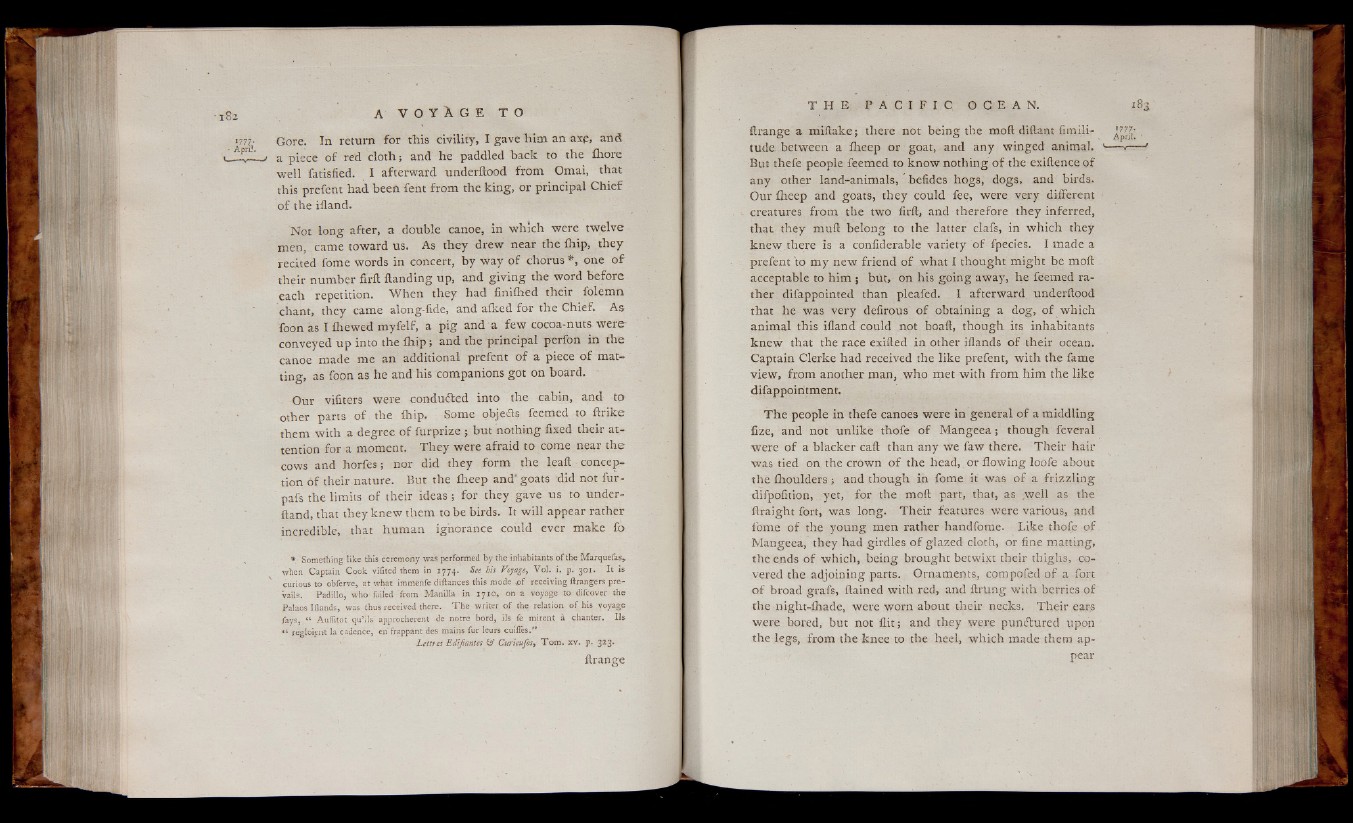
Gore. In return for this civility, I gave him an axe, and
a piece of red cloth; and he paddled back to the ihore
well fatisfied. I afterward underftood from Omai, that
this prefent had been fent from the king, or principal Chief
of the iiland.
Not long after, a double canoe, in which were twelve
men, came toward us. As they drew near the Ihip, they
recited fome words in concert, by way of chorus *, one o f
their number firft Handing up, and giving the word before
each repetition. When they had finiihed their folemn
chant, they came along-fide, and aiked for the Chief. As
foon as I fhewed myfelf, a pig and a few cocoa-nuts were
conveyed up into the ihip; and the principal perfon in the
canoe made me an additional prefent of a piece of matting,
as fopn as he and his companions got on board.
Our vifiters were conducted into the cabin, and to
other parts of the ihip. Some objeas feemed to ftrike
them with a degree of furprize ; but nothing fixed their attention
for a moment. They were afraid to come near the
cows and horfes; nor did they form the leaf! conception
of their nature. But the Iheep and' goats did not fur-
pafs the limits of their ideas ; for they gave us to under-
ftand, that they knew them to be birds. It will appear rather
incredible, that human ignorance could ever make fo
* Something like this ceremony was performed by the inhabitants of the Marquefas,
when Captain Cook vifited them in 1774. See bis Voyage, Vol. i. p. 301. It is
curious to obferve, at what imtnenfe diftances this mode 4>f receiving ftrangdrs prevails.
Padillo, who failed from Manilla in 1710, on a voyage to di (cover the
Palaos Iflands, was thus received there. T h e writer of the relation of his voyage
fays, “ Auflitot qu’ils' approcherent de notre bord, ils fe mirent a chanter. Ils
« regloient la cadence, eh frappant des mains fur leurs cuiiles.”
Lettses Edijiantes & Curieufes, Tom. xv. p. 323.
ftrange
ftrange a miftake; there not being the moft diftant fimilitude
between a iheep or goat, and any winged animal. 1----t—
But thefe people feemed to know nothing of the exiftence of
any other land-animals, befides hogs, dogs, and birds.
Our iheep and goats, they could fee, were very different
creatures from the two firft, and therefore they inferred,
that they muft belong to the latter clafs, in which they
knew there is a confiderable variety of fpecies. I made a
prefent to my new friend of what I thought might be moft
acceptable to him ; but, on his going away, he feemed rather
difappointed than pleafed. 1 afterward underftood
that he was very defirous of obtaining a dog, of which
animal this iiland could not boaft, though its inhabitants
knew that the race exifted in other iflands of their ocean.
Captain Clerke had received the like prefent, with the fame
view, from another man, who met with from him the like
difappoiritment.
The people in thefe canoes were in general of a middling
fize, and not unlike thofe of Mangeea; though feveral
were of a blacker caft than any we faw there. Their hair
was tied on the crown of the head, or flowing loofe about
the fhoulders ; and though in fome it was of a frizzling
difpofition, yet, for the moft part, that, as well as the
ftraight fort, was long. Their features were various, and
fome of the young men rather handfome. Like thofe of
Mangeea, they had girdles of glazed cloth, or fine matting,
the ends of which, being brought betwixt their thighs, covered
the adjoining parts. Ornaments, compofed of a fort
o f broad grafs, ftained with red, and ftrUng with berries of
the night-ihade, were worn about their necks. Their ear;s
were bored, but not flit; and they were punitured upon
the legs, from the knee to the heel, which made them appear